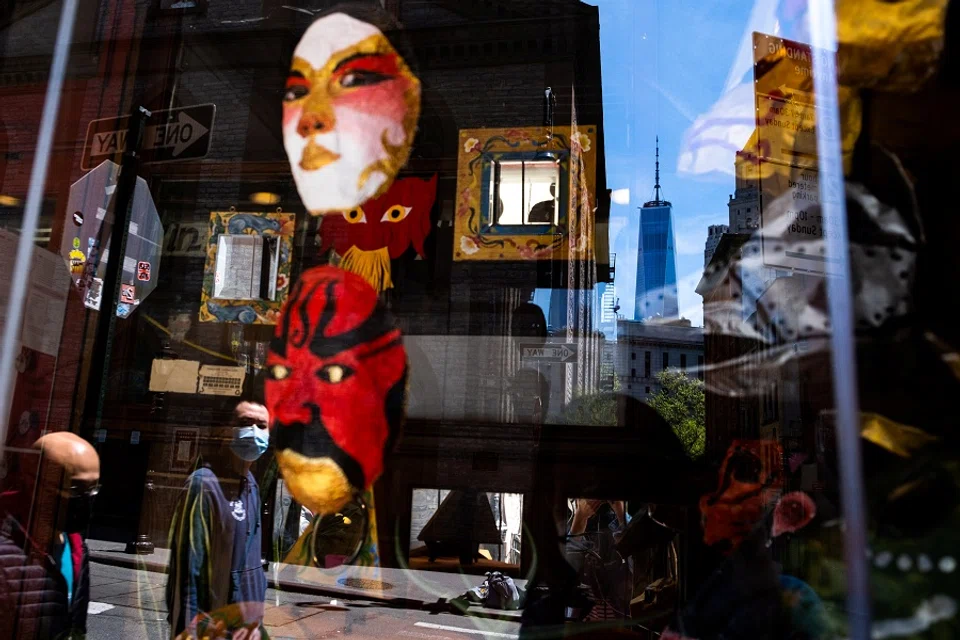Why do Chinese and Indian Americans stay silent during the US anti-racism protests?
Nothing is black and white when it comes to race debates, says Yu Shiyu. What if you're not black but 'brown' as some term it, that is, a minority nonetheless. Some Asian Americans of Chinese and Indian descent have been labelled model minorities for largely rising through the ranks though they face some forms of discrimination. Question is, if they don't see the current protests as their fight and stay out of the fray, are they equally culpable?

Anti-racism protests sparked off by black American deaths at the hands of the police continue unabated. This issue has not only become a key topic in the run-up to the Presidential elections, but also ignited criticism against historical figures with human rights transgressions.
Black Americans aside, other major players in this anti-racism tide include a large number of white liberals or baizuo (白左, lit. white left, a derogatory term used on the Chinese internet to refer to those with Western leftist ideologies). On the other hand, Asian Americans, who are also part of the minority, seem to be more passive and inactive, prompting an analysis by CNN about "South Asian diasporas" maintaining a "brown silence" amid anti-racism protests jointly initiated by whites and blacks.
to first-generation Asian immigrants, there is no reason why large numbers of black Americans ... would still be stuck in their current state of poverty and criminal behaviour
It is important to understand the social background here. These Asian Americans are modern immigrants represented by those of Chinese and Indian descents. They are generally successful in European and American societies and have become part of the upper-middle class in economic status within a short span of time from the first generation to the second generation. They are also law-abiding in general, and have earned themselves the label of being model minorities. While they do face discrimination of some sort, they have basically risen through the ranks in Western society through blood, sweat, and tears.
Thus, to first-generation Asian immigrants, there is no reason why large numbers of black Americans who already enjoy "equal rights" to various welfare policies would still be stuck in their current state of poverty and criminal behaviour.
Even Mahatma Gandhi - the national hero who helped achieve India's independence - had discriminated against the blacks.

An open letter from a second-generation Chinese American student at Yale University criticising the "rampant anti-Blackness in the Asian American community" triggered strong backlash from first-generation Chinese immigrants. Immigrants of Indian descent are also among those who possess longstanding discrimination against the black community. Similar to the Chinese community, such discrimination has its roots in the intellectual class of their motherland. Even Mahatma Gandhi - the national hero who helped achieve India's independence - had discriminated against the blacks. This was also the reason why Gandhi's statue was removed from the University of Ghana two years ago.
The best example of the self-selection phenomenon is this: among all races in the US, immigrants who came from Nigeria - not those from Asia - are the ones on average with the highest levels of education.
I believe that immigrants of Asian descent despise the black community for "being lazy" based on their own success. By doing so, they overlook the self-selection factor of modern immigrant groups. Under modern Western immigrant policies, immigrants who come to live in Europe and the US mainly belong to the highly educated elite groups and other groups of hardworking, determined, and resilient people in their native countries. Their intelligence and other qualities differ from descendents of earlier generations of African Americans who had been sold to the US as slaves and who had endured long periods of discrimination.
The best example of the self-selection phenomenon is this: among all races in the US, immigrants who came from Nigeria - not those from Asia - are the ones on average with the highest levels of education. This runs counter to the view that black Americans have low intelligence.
New generations of Chinese immigrants have no historical memory of the Chinese Exclusion Act and are thus unable to empathise with the fact that large numbers of Chinese were once the victims of racism in the US.

Secondly, almost all successful Chinese immigrants in the US are first- and second-generation immigrants who have come to the US most recently. There are hardly any Chinese immigrants whose ancestors were Chinese labourers who had been sold to North America hundreds of years ago and endured long periods of discrimination. In fact, this is yet another example of self-selection. New generations of Chinese immigrants have no historical memory of the Chinese Exclusion Act and are thus unable to empathise with the fact that large numbers of Chinese were once the victims of racism in the US.
Another reason why Chinese immigrants in the US discriminate against the black community is because of the monolithic social environment of their homeland. In addition, as Chinese immigrants congregate in metropolitan areas with large black communities, individuals, relatives and friends have often become the victims of crimes committed by black perpetrators. These are all social realities that cannot be changed in the short term.



![[Photos] Fact versus fiction: The portrayal of WWII anti-Japanese martyrs in Taiwan](https://cassette.sphdigital.com.sg/image/thinkchina/3494f8bd481870f7c65b881fd21a3fd733f573f23232376e39c532a2c7593cbc)

